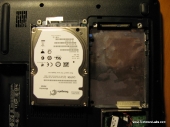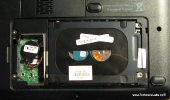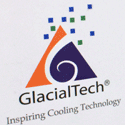Test System
The test setup used to put the drive through the test bed today will be a moderately equipment laptop based on the HP Pavilion dv2500t CTO, with upgraded aftermarket RAM and the Seagate Momentus 750GB. A fresh install of Windows 7 and a few hours waiting for the latest Windows updates and driver install, we are ready to test. Today we will use synthetic benchmark tools to provide a good indication of the drive’s performance namely: ATTO Disk Benchmark, CrystalDiskMark, and HD Tune.
| Processor (CPU) | Intel T7500 (2.20 GHz, 800 MHz FSB, 4M Cache) |
| Chipset | Intel PM965 |
| Memory (RAM) | 4GB (2×2) DDR2-667 |
| Graphics | nVidia GeForce Go 8400M GS |
| HDD | Seagate Momentus 750GB |
| Operating System | Windows 7 Ultimate x64 |
 |
 |
| About to install the Seagate drive into the laptop | In place and ready to rock! |
Drive Specifications
A Quick rundown of the technical specification of the ST9750420AS drive. This drive does not feature the self-encrypting technology mentioned in the introduction, and most users will not require this feature (government, private sector usage mostly for privacy/regulation requirements) The 750GB momentus drive is a SATA II or 3Gb/s interface drive with 750GB capacity, 7200RPM, and 16MB cache.
| Model ST9750420AS | |
|---|---|
| Model Number | ST9750420AS |
| Interface | SATA 3Gb/s |
| Cache | 16MB |
| Capacity | 750GB |
| Areal density (avg) | 541Gb/in2 |
| Guaranteed Sectors | 1,465,149,168 |
| PHYSICAL | |
| Height | 9.5mm (0.370 in) |
| Width | 69.85mm (2.750 in) |
| Length | 100.35mm (3.951 in) |
| Weight (typical) | 115g (0.254 lb) |
| PERFORMANCE | |
| Spin Speed (RPM) | 7200 RPM |
| Average latency | 4.2ms |
| Random read seek time | 11.0ms |
| Random write seek time | 13.0ms |
| I/O data transfer rate | 300MB/s |
| Unrecoverable read errors | 1 in 1014 |
| RELIABILITY | |
| Annual Failure Rate | 0.5% |
| POWER | |
| 5V start max current | 1.0A |
| Average idle power | 0.96W |
| Average seek power | 2.5W |
| ENVIRONMENT | |
| Ambient Temperature | |
| Operating | 0°–60°C |
| Nonoperating | -40°–70°C |
| Maximum operating temperature change | 20°C per hour |
| Maximum nonoperating temperature change | 35°C per hour |
| Shock | |
| Operating Shock (max) | 350 Gs for 2ms |
| Nonoperating Shock (max) | 1000 Gs for 1ms |
| ACOUSTICS | |
| Acoustics (Idle Volume) | 2.3 bels |
| Acoustics (Seek Volume) | 2.5 bels |

All new drives,whether SSD,SSH or HDD should be SATA III 6gb/s,with backward compatibility for SATA II ans SATA 1.
The switch needs to be made,NOW!
Rotational media and most released SSD’s barely max out the bandwidth of SATA-IO spec SATA II, releasing all drives with SATA III as standard would increase costs so the switch is not totally necessary right now.
If the device is capable of SATA III speeds and exceeds SATA II speeds then yes it should definitely be SATA III